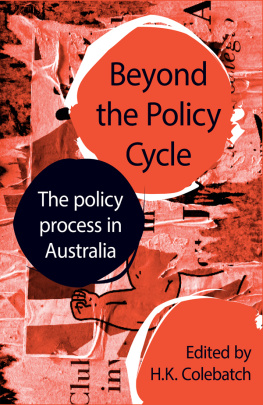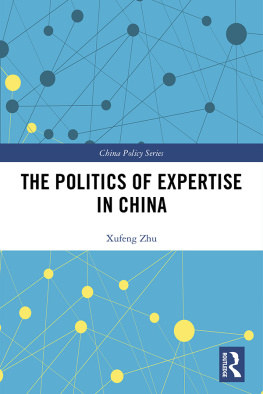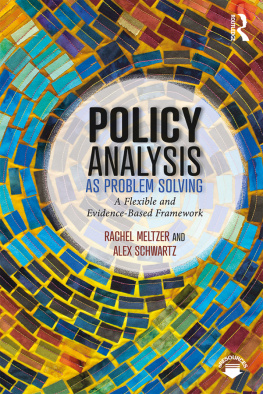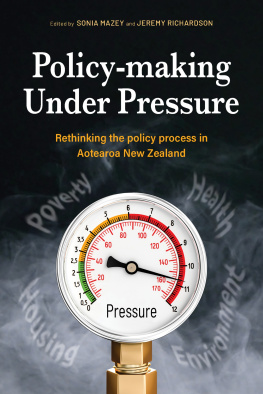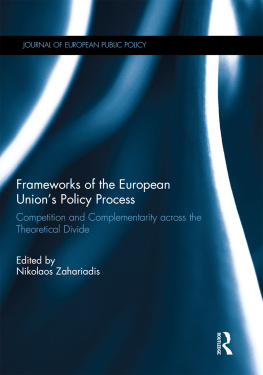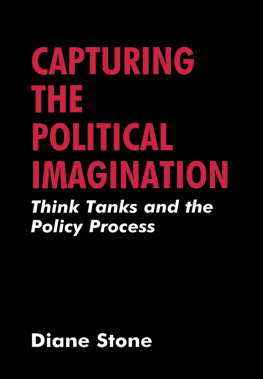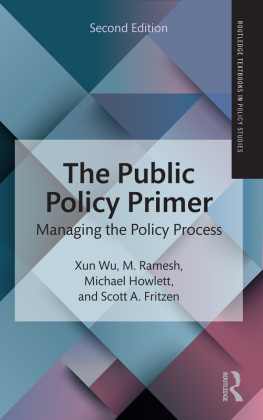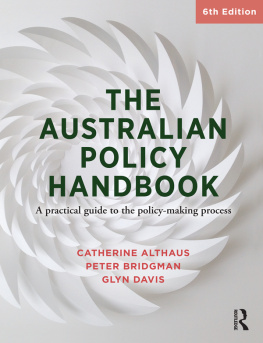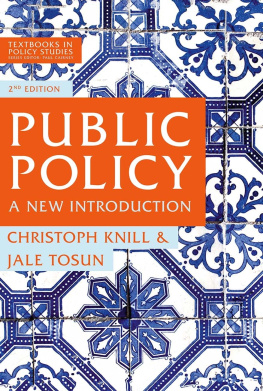First published in 2006
Copyright H.K. Colebatch 2006
Individual copyright of chapters remains with the authors.
All rights reserved. No part of this book may be reproduced or transmitted in any form or by any means, electronic or mechanical, including photocopying, recording or by any information storage and retrieval system, without prior permission in writing from the publisher. The Australian Copyright Act 1968 (the Act) allows a maximum of one chapter or 10 per cent of this book, whichever is the greater, to be photocopied by any educational institution for its educational purposes provided that the educational institution (or body that administers it) has given a remuneration notice to Copyright Agency Limited (CAL) under the Act.
Allen & Unwin
83 Alexander Street
Crows Nest NSW 2065
Australia
Phone: (61 2) 8425 0100
Fax: (61 2) 9906 2218
Email: info@allenandunwin.com
Web: www.allenandunwin.com
National Library of Australia
Cataloguing-in-Publication entry:
Beyond the policy cycle: the policy process in Australia.
Bibliography.
Includes index.
ISBN 1 74114 873 1.
1. Political planningAustralia. 2. Political planning
AustraliaCitizen participation. 3. Public administration
AustraliaDecision making. 4. AustraliaPolitics and
government2001 . I. Colebatch, H. K. (Hal K.).
320.60994
Index compiled by Dr Peta Colebatch
Set in 11/13.5 pt Bembo by Bookhouse, Sydney
Printed by CMO Image Printing, Singapore
10 9 8 7 6 5 4 3 2 1
MAPPING THE WORK OF POLICY
H.K. Colebatch
When we talk about policy, the focus is usually on the subject matter: health policy, transport policy, environment policy, etc. This is not surprising. If policy is, in Dyes often-quoted words, What Governments Do, Why They Do It, and What Difference It Makes (Dye 1976), then our attention will naturally go to the object of policy: what is the problem, and how is the government trying to address it? The process of policy gets less attention; it is seen as complex and a source of difficulty. It is recognised that there are many players and they are not all reading from the same script, but this simply means the policy worker has to be adroit in steering through this complexity to the accomplishment of the goal.
This book takes a different approach. It recognises that the world of policy is populated by a range of players with distinct concerns, and that policy-making is the intersection of these diverse agendas, not a collective attempt to accomplish some known goal. It also recognises that for most of the players, policy activity is workthat is, a specialist occupation, but not necessarily one with policy in the title. The people doing policy work may be called policy analysts, but they may have titles like customer service manager, chief veterinary officer or president of the association. Who the actors are, and what they do to shape the outcomes, is part of the question, and passing references to policy analysis or policy advice do little to answer the question. The concern of this book is how the work of policy is put together in Australia, and about the variations, tensions and changes that are part of policy-making.
POLICY PRACTICE AS WORK
Not all activity is work. Refereeing a football match may be an unpaid voluntary act performed for the love of the game, or a task reluctantly accepted as one of the obligations of parenthood. When the referee is paid, it may be a full-time job, a modest addition to the main occupation, or an incidental task incurred in performing another job (such as a schoolteacher). It is not an either/or choice between work and not work; there are different aspects and degrees of each. Are referees recruited on the basis of qualifications? Do they wear a uniform? Do they have any other duties? Is there a career path? In this case, as in others, there are many different answers to these questions, and the extent to which refereeing is work is variable and specific (see Pahl 1988).
This analogy helps us to think about the changing ways in which policy is made. For some participants, such as cabinet ministers, their involvement in the policy process is a consequence of their success at demonstrating political leadership. They are unlikely to see themselves as policy experts, and they move between policy fields, or out of them, as a result of shifts in the political terrain. Others, like members of a cabinet secretariat, are permanent, paid, expert custodians of policy processes. Some participants may be experts in functional areas (e.g. soil erosion) who become involved in policy activity as a part of their expert work. And there may be unpaid participants, such as a group of cancer sufferers who have become very knowledgeable in relation to their condition. They devote a great deal of time to pressing their case not because they are paid, but because they are committed to the cause, and to each other. Since there is such a diversity of activity involved in making policy it is important to explore what it is that people dothe work of policyand the ways in which it is changing.
POLICY AS AN ORGANISING CONCEPT IN AUSTRALIAN GOVERNMENT
In the past few decades, policy has developed a higher profile in the organisation of governing in Australia. There has been a marked rise in the use of policy to designate organisational units and position titles, and in the demand for the definition of policy on subjects as diverse as the need for foreign language skills and the amount of water used in showering. Within government, policy has developed an identity as a function quite distinct from technical knowledge in the relevant field. Health policy or transport policy, for instance, came to be recognised as bodies of expertise in their own right, and as bases for the critique of the activities of technical specialists in these fields. A focus on policy was seen as a counter to the functionalist inertia of institutionalised technical expertise; for instance, by not posing the question as How do we build another dam to satisfy the rising demand for water? but as Is building another dam the best way to bring supply and demand into alignment? For this reason, it was common to find people with non-technical backgrounds in the newly established policy units.

